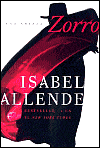
Zorro by Isabel Allende
2005 Harper Collins 390 pgs
I guess I had always assumed that the "official" legend of Zorro was recorded for posterity way back in the day and that the various movies about the hero, such as the one starring dear Mr. Banderas, more or less follow that original storyline. Upon reading a review before picking up Isabel Allende's recent rendering of the masked swashbuckler, I learned that no "official" telling exists and that Zorro's tale is very much up for interpretation.
I'm sorry to say that Allende's offering is rather disappointing. While I understand that character development is one of the marks of a good novel, Allende spends so much time and so many words on the members of a large ensemble cast that it would be more aptly titled Zorro et al. Rather than build up the legend of Zorro with suspenseful accounts of daring exploits in the name of justice, Allende reduces his story to a meandering melodrama full of unrequited love and impulsive acts done in the name of passion and impudence. Beneath the mask, Diego de la Vega is an awkward kid with big ears who feigns the constitution of a pansy to avoid conflict, while his best friend and "milk brother" Bernardo has about as much personality as tree bark. I've always thought heroes are supposed to be magnetic, alluring, captivating...I had a hard time deciding if I even liked Diego or his masked alter ego.
Finally, the other thing that killed this book was the narrator. I can think of only one other narrator I have encountered along my journey through literature whom I found to be so utterly annoying. (For those of you who are curious, it's William Goldman in his retelling of the supposed S. Morgenstern classic, The Princess Bride--yes 80's movie lovers, it was a book first.) Allende decides to give the narrator a voice of her own and a mysterious identity that is not revealed until the epilogue (unless of course you actually cared enough to try and figure it our earlier on). The narrator's occasional interjections add nothing to the story and only serve to irritate the reader and produce thoughts of "Why do I care?" The prime example of this is found at the transition between Parts 3 and 4. She ends part 3 moaning, "I regret to tell you that I can write no more, because I have run out of the goose-quill pens I always use. ...I do not use quills from ordinary birds; they stain the paper and rob elegance from the page." Four pages later, Part 4 begins with "I now have new goose-quill pens to continue the story of Zorro's youth." Ugg, I am bored just quoting it.
So, I suggest you read Zorro only if you're in the mood for tedious villains, a large cast of questionably likeable characters, and irritating narration. (To Allende's credit, I'm sure the telling is better in its original Spanish, though not even that could save her portrait of Zorro from being less than thrilling.)
No comments:
Post a Comment